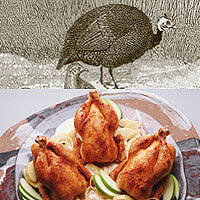Search Healthnotes
Guinea Fowl

Storing
Store fresh guinea fowl in its original wrapping, over-wrapped with aluminum foil to catch leakage. Store in the coldest part of the refrigerator. Raw guinea fowl can be refrigerated for two days. To store cooked guinea fowl, remove meat from the bone, wrap it in plastic or foil, and keep it in the coldest part of the refrigerator for no more than three days. Fresh guinea fowl should be frozen if you do not plan to cook it within two days of purchase. Store in original wrapping over-wrapped with foil, or wrap in foil or freezer bags. Be sure to press the air out of the package before freezing. Frozen guinea fowl can be stored in the freezer for three months. Cooked guinea fowl may be frozen in the same manner, unless the dish is made with sauce or gravy. In that case, pack meat in a rigid container and freeze. Thaw frozen guinea fowl in the refrigerator; never thaw at room temperature. In the refrigerator, a whole guinea fowl (2 to 3 pounds or 900 to 1,350g) will thaw within 24 hours. Guinea fowl may also be thawed by immersing in cold water. Leave guinea fowl in original wrappings or place in a watertight bag, and change water every 30 minutes. Guinea fowl will thaw in about two hours. For quick-thawing of raw or cooked guinea fowl, use the microwave at the Defrost or Medium-Low setting, according to the manufacturer’s directions. Turn guinea fowl as it thaws, between zaps; take care that the guinea fowl does not begin to cook. If not served immediately, keep cooked guinea fowl either hot, between 140 and 160°F (60 and 71°C), or refrigerate it at 40°F (4.4°C) or lower. When transporting cooked guinea fowl to another dining site, place it in an insulated container or ice chest until ready to eat.
Copyright © 2024 TraceGains, Inc. All rights reserved.
Learn more about TraceGains, the company.
The information presented in the Food Guide is for informational purposes only and was created by a team of US–registered dietitians and food experts. Consult your doctor, practitioner, and/or pharmacist for any health problem and before using any supplements, making dietary changes, or before making any changes in prescribed medications. Information expires December 2024.











